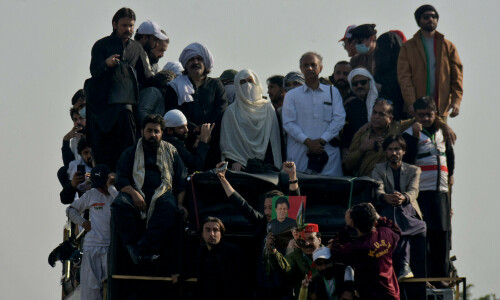ISLAMABAD, Oct 12: President Pervez Musharraf assured the nation on Wednesday there would be no more delay in providing succour to the earthquake-stricken people and said things were now moving fast to turn the present adversity into betterment.
In a broadcast over the national radio and television networks he blamed the destruction of the communication system and a deficiency of helicopters for what he called some delay in reaching the sufferers after Pakistan’s worst earthquake struck Azad Kashmir and some districts of the NWFP on Saturday.
But, apparently reacting to opposition criticism of the government’s handling of the situation, he said in his Urdu-language speech that the relief operation would now be carried out “very efficiently” because the army and other state and private relief agencies had been mobilized for the onerous task.
However, he complimented “the attitude of all political parties and even opposition parties” as he praised what he called the “self-confidence and unity” shown by the people, the role of the military, particularly the army engineers, doctors and NGOs such as the Edhi Trust. He also thanked foreign countries for their help and said Pakistan had accepted aid even from arch-rival India “in certain forms”.
In remarks obviously directed at opposition parties, the president called for avoiding mud-slinging, which he called “a sign of defeat” and added: “We have to face the situation with self-confidence and cool temperament and this should also reflect in the media.”
General Musharraf, who was dressed in a dark civilian suit as he spoke hours after presiding over a special meeting of the National Security Council (NSC), appealed for generous donations to the President’s Relief Fund at home, particularly from the business community, and from abroad and promised that the amount would be used in “the most transparent manner”.
He complimented what he called an enthusiastic response by the general public and non-governmental organisations to the relief effort but said all such operations should be coordinated with a relief commissioner at the Prime Minister’s secretariat in Islamabad and relief commissioners appointed in all the four provinces.
In a move he described as necessary to optimize the benefit of the first phase of the relief effort, he said the relief agencies or NGOs should receive guidance from provincial relief commissioners about areas where assistance was required and then get in touch with local military commanders in the stricken areas for the delivery of relief goods.
The president said the clearance of the debris of the destroyed buildings and infrastructure as well as reconstruction would take “months and years”, but added: “I am sure we have the resources for this and we will turn this adversity into betterment.” He also announced a government help of Rs100,000 for every dead person and Rs50,000 for every injured person and said the provincial and army authorities would ensure the amount was delivered to genuine claimants.
The president repeated the same quake casualty figure of at least 23,000 killed and 50,000 injured as was given by Prime Minister Shaukat Aziz on Tuesday, but said the full magnitude of the disaster was still unknown from villages that had remained inaccessible because of blocked roads and shortage of helicopters.
However, he said while more troops had been sent into the stricken areas, army units deployed after every 15 to 20 km would go into remote areas while satellite imagery would also be used to assess the damage.
Health Minister Mohammad Nasir Khan had put the quake death toll between 25,000 and 30,000 in a speech in the National Assembly on Tuesday while some television networks have given higher figures ranging from 33,000 to more than 50,000.
Referring to the state machinery’s initial delay in responding to disaster after the quake, measured 7.6 on the Richter scale, struck on Saturday morning, the president said no country “remains prepared for such a calamity. It has to react.”
He said while the authorities immediately reacted to the collapse of an apartment building in Islamabad, they took eight to 12 hours in getting information about other affected areas in Azad Kashmir and the NWFP.
While praising engineers for reopening the two key roads to the destroyed Azad Kashmir capital Muzaffarabad within 48 hours, he said there had been delay — which he regretted — in extricating the victims from the rubble, providing them medical treatment and burying the dead because the army and civil administrations there were themselves affected.
He said now when the key roads had been reopened and more troops and helicopters had been inducted, “the relief operation will be carried out very efficiently”.
The president acknowledged there had also been delay in providing immediately needed tents, blankets, medicines and food and said now these supplies would be provided expeditiously.
He said tents were being arranged from abroad because of short supplies at home while medicines were also reaching here from all over the world and mobile surgical teams and field hospital were being arranged.
The president said food packages containing wheat flour, rice, lentils, ghee, tea, sugar and milk powder prepared by the Utility Stores Corporation would be provided to the affected people.














































Dear visitor, the comments section is undergoing an overhaul and will return soon.